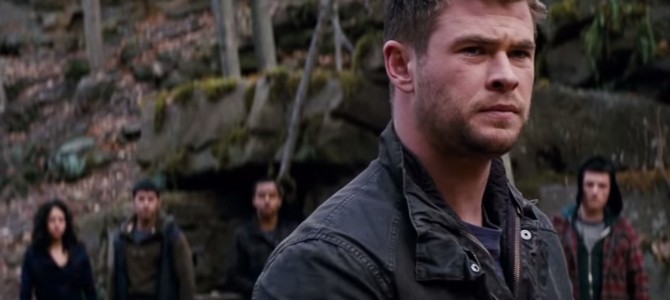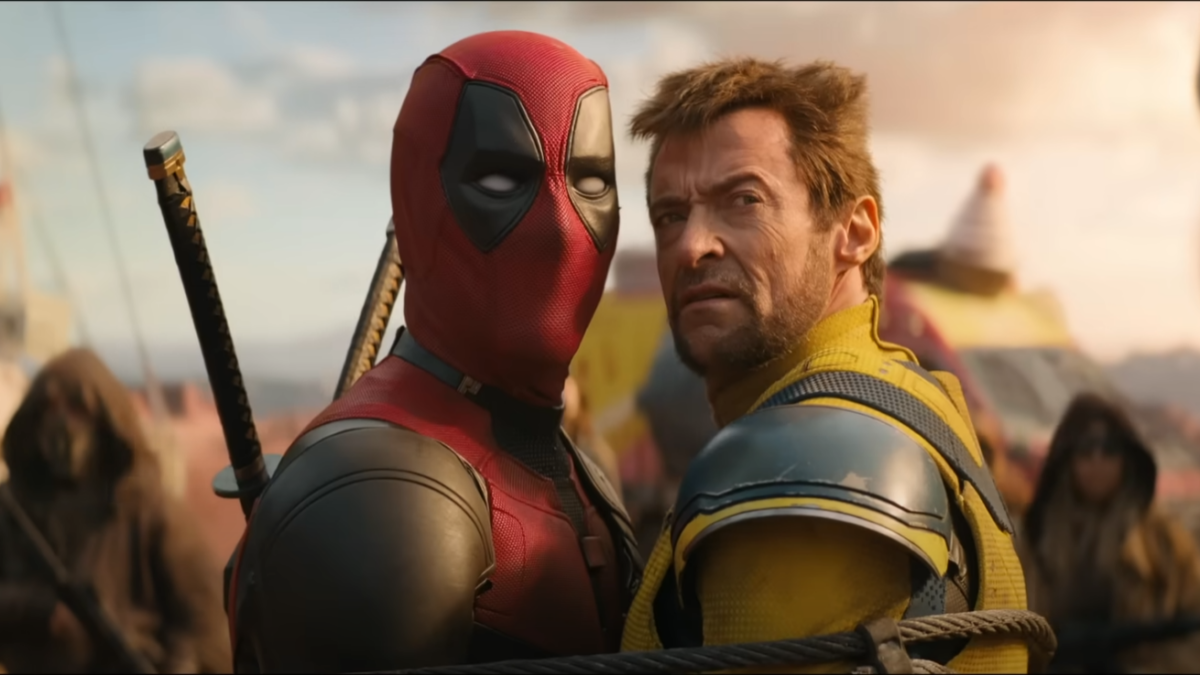
At first, it seems typical Hollywood promotional hyperbole. “This movie has been rebooted because the film makers all loved the original movie,” said “Red Dawn” producer Tripp Vinson. “If you like meat with your potatoes, muscle cars that roar, tanks, guns and things blowing up by Americans kicking some Commie ass—then we have something special coming your way!”
However, Vinson was not appearing on a late-night talk show pimping his soon-to-be released summer blockbuster. This quote came in a face-saving PR release, after it was announced “Red Dawn” was undergoing a start-to-finish makeover. Rather than a simpler retooling with creative editing and reshot scenes, Vinson’s production studio, Metro Goldwyn Mayer (MGM), ordered him to completely alter his film, with the film’s primary antagonist removed and a newer threat inserted. No longer was our nation going to be invaded by the Chinese Red Army in his already completed film. Instead, it would the North Koreans breaching our border.
This order was handed down for one reason: to appease China. That a studio would not only endure the cost of digitally scrubbing a movie but command that a film-maker drastically alter his vision was a touchstone moment in Hollywood’s history. In the years since this stark affront to artistic integrity, film studios have routinely shown a willingness to compromise creative values and submit to self-censorship, all in the name of the all mighty dollar—or, more specifically, the Yuan.
Money Versus Freedom? We’ll Take Money
Hollywood used to be the torch-bearer of freedom-of-expression protections. Whether it was battling the Black List days of the 1940s, opposing the Motion Picture Association of America ratings code mandates, or resisting blame in the 1980s for inspiring teenage violence, the entertainment industry always made a stand against altering artistic content. Any time these pressures arose, the initial defense would be an accusation of censorship, then trumpeting the integrity of the First Amendment.
Even the advance of the leftist political-correctness movement wouldn’t sway liberal entertainment producers. Any time an aggrieved group voiced displeasure with a cinematic depiction, they were brushed aside with the standard defenses. The Catholic Church was rebuffed by rote over its opposition to unorthodox content. Arnold Schwarzenegger’s “True Lies” was said to cast Middle Easterners in a bad light, and met a collective shrug. Jesse Jackson called for scenes of the film “Barbershop” to be cut for poor representation of black history, which led to nothing. When LGBT groups opposed a toss-away joke in “The Dilemma,” all the creators did was enjoy the free publicity their movie received.
These days, those high-minded stances have been tossed into a trash can on the corner of Hollywood and Vine. Studios frequently submit to calls for revision of content, avoidance of subjects, or mandated inclusion of vital components. The Chinese film industry is not only growing but becoming vital to movie studios’ financial standing. The leadership of that nation rules the entertainment options therein with an iron fist, and not only dictates what they will allow to be shown on screens but threatens economic reprisals against entities that violate their requirements.
And Hollywood is no longer willing to stand up for those freedoms.
Gone are the entertainment leaders who would loudly announce to the press any attempts to squelch their creative voice. Submitting to governmental scolds and employing self-censorship is now the norm. The industry that resisted the effort to rid itself of communist sympathizers now bows reverently in the hopes of gaining favor with a communist leadership that will reward them handsomely. Hollywood views the lucrative Chinese marketplace as so integral it will routinely compromise artistic integrity.
Yellow Spines Over Red Ink
In 2009, when MGM gave the green-light to produce “Red Dawn,” China had a banner year for western movie titles. Two films—“2012” and “Transformers: Revenge of the Fallen”—topped the year-end list in theater grosses, each earning more than $60 million in ticket sales. For the longest time, China was a small player in the international box office, but in the last decade it has quickly grown to a major income force. One example: “Furious 7” has earned more in mainland China than here in the United States—approaching $400 million.
This is the kind of money to make studios salivate. To learn why entertainment outlets would be willing to bend to force and demand artistic corruption upon their own properties, you need to understand the specifics of the Chinese film economy. This is a state-run industry with harsh limits, byzantine rules, and numerous arbitrary, sometimes capricious decisions. Hollywood is more than willing to play the kept woman, compromising standards and cowing to state demands to keep the money flowing.
One of the rules Communist leaders have is a ceiling on how many foreign films can be released. Currently, the amount of Hollywood-produced titles permitted in Chinese theaters is around 34, annually. The desire of studios to gain access into this limited market leads to capitulation in numerous ways. Movies are routinely altered to meet the strict commands. Sex is almost always excised, and violence is commonly truncated. But other odd decisions are in play. (One rule shows they don’t allow time travel plot points, for example.)
Chinese censors target more than just objectionable scenes. Negative portrayals of citizens and any content deemed insulting to the nation will likely be ordered out of the final cut. This can lead to curious, sometimes baffling decisions regarding western films.
The main villain in “Iron Man 3” had to be renamed something besides The Mandarin, for obvious reasons. The outbreak of a zombie virus in “World War Z” that originated in China was changed. In “Pirates of the Carribean: At World’s End,” the actor Chun Yow Fat was edited out, because displaying a Chinese pirate was not acceptable. “Men In Black 3” had to remove Asian-American characters because they were revealed to be aliens in disguise. Even innocuous displays have been removed. “Mission Impossible: 3” had to remove a brief scene where Tom Cruise was in an exterior shot. The reason was the laundry seen drying outside of numerous dwellings. Censors opposed showing that most Chinese citizens could not afford washers and dryers.
These arcane decisions, while artistically offensive, are relatively easy fixes. What is more vexing is when an entire property can be regarded as a broad offense. It is not as easy a decision as saying the film will simply not be released in Chinese theaters. The communist government, by way of threatening economic reprisals, actually exerts influence over the Hollywood product. More than that, studios have been indicating a willingness to enter into partnerships with China to produce content that may land anywhere between jingoistic to outright agitprop.
Nice Little Movie You Have There
Vinson tried to sell the upside of altering his movie. In the Los Angeles Times he was quoted: “After careful consideration we constructed a way to make a scarier, smarter and more dangerous Red Dawn that we believe improves the movie.” Understand, this was a man describing a film he was ordered to change from his original vision. His words seem delivered through gritted teeth, especially when the concept of exchanging the Chinese Army with North Koreans is beyond farcical. The NoKos have an Air Force comprised of Vietnam War-era hardware and no discernable navy. Should their underfunded troops even manage to reach our shores, a single aircraft carrier could destroy their nation, made defenseless in their absence. A Nork invasion is beyond implausible; it requires a sit-com laugh track.
Despite the oppressive call to change an entire film, Vinson’s bosses had little choice. In 2009, MGM faced a dilemma. For years, the studio had wavered on the edge of bankruptcy. There was so little capital the company had difficulty getting even a few titles into theaters each year and was only staying afloat on the strength of a lone property—the James Bond movies. Producers managed to rejuvenate that franchise by putting Daniel Craig in the title role, and with that success decided to fund a new venture.
The studio calculated a remake of the 1980s cult hit “Red Dawn” would be a solid gamble. Audiences were receptive to reboots, and a young, charismatic cast might draw younger ticket buyers along with a built-in audience. But upon completion there was a problem. MGM found it had an un-releasable title.
One of the handicaps in being a cash-strapped studio was that MGM did not have its own distribution network, so it relied on other studios to get its titles into theaters. Nobody would touch the new version of “Red Dawn.” Even with no involvement with the production, no other company wanted to be associated with the film, for fear the negative portrayal of the invading Chinese army on film would impact future business deals in that nation. The completed “Red Dawn” languished in the studio vault for years.
MGM knew very well why they possessed a movie without a theater. Years earlier, the studio had released the film “Red Corner,” a harsh indictment of the Chinese legal system, netting it economic “punishment” from that national government. At the time, China was not so big a player in the foreign box office. Now that has changed. After targeted industry expansion and increasing theater counts for years, it now ranks as the No. 1 foreign territory for box-office returns. The studio had little recourse but demand their property be completely altered. Twenty months later, “Red Dawn” finally made its way to theaters.
From Resistance to Cooperation
Why no studio dared to release a Chinese-invading film has more reasons than just potential box-office returns (although that lucre alone is sizeable). Most movie studios are parts of larger conglomerates, and being frozen out of the Chinese market could mean more than a movie not playing in Peking. Sony would be loath to have its electronics products tariffed over a potentially offensive movie, for one example. For this reason, Hollywood is not only taking censorship orders, studios are now playing along.
In recent years, films have been shoehorning Chinese content, casting native actors, and centering entire plot lines on locales attractive to the booming audience. More than excising a character’s name from the comic-book cannon, the Chinese edit of “Iron Man 3” also had product placement, with Tony Stark drinking a brand of Chinese milk, and an insert scene with numerous mainland actors as doctors operating on the lead character.
For the film “Looper,” writer/director Rian Johnson was up against budget problems, but when a Chinese production company offered financial assistance scenes were rewritten to take place in Shanghai instead of Paris. This had a two-fold benefit for the production: the movie was allowed past that arcane time-travel restriction, and it qualified as a Chinese co-production, thus bypassing the limit on western-produced films.
“Transformers: Age of Extinction” was more of a full collaboration with Chinese studios. Parent company Paramount staged multiple scenes in China with local actors. This also qualified the studio for a larger payout. On average, the Western cut of Chinese box-office receipts is around 25 percent; a co-production means Paramount received over 40 percent That was a windfall, as “Transformers 4” also earned more in China than it did stateside—$320 million versus $245 million.
It has become more than obvious why Hollywood is willing to compromise its artistic principles. The money to be had is made in China. One other reality fuels this self-censorship. Domestic box-office totals have relatively plateaued in recent years. Gimmicks like 3D premiums and inflated pricing mask that the number of U.S. tickets bought have been in steady decline for most of the past decade.
China’s booming market is more than tempting; it points to survival. A study has estimated that the Chinese movie market will become larger than U.S. domestic box-office returns in five years. This indicates that Hollywood’s desire to silence itself will not just continue, but likely expand. As long as they are rewarded, our culture stands to be punished.
“Red Dawn” was never released into Chinese theaters.









